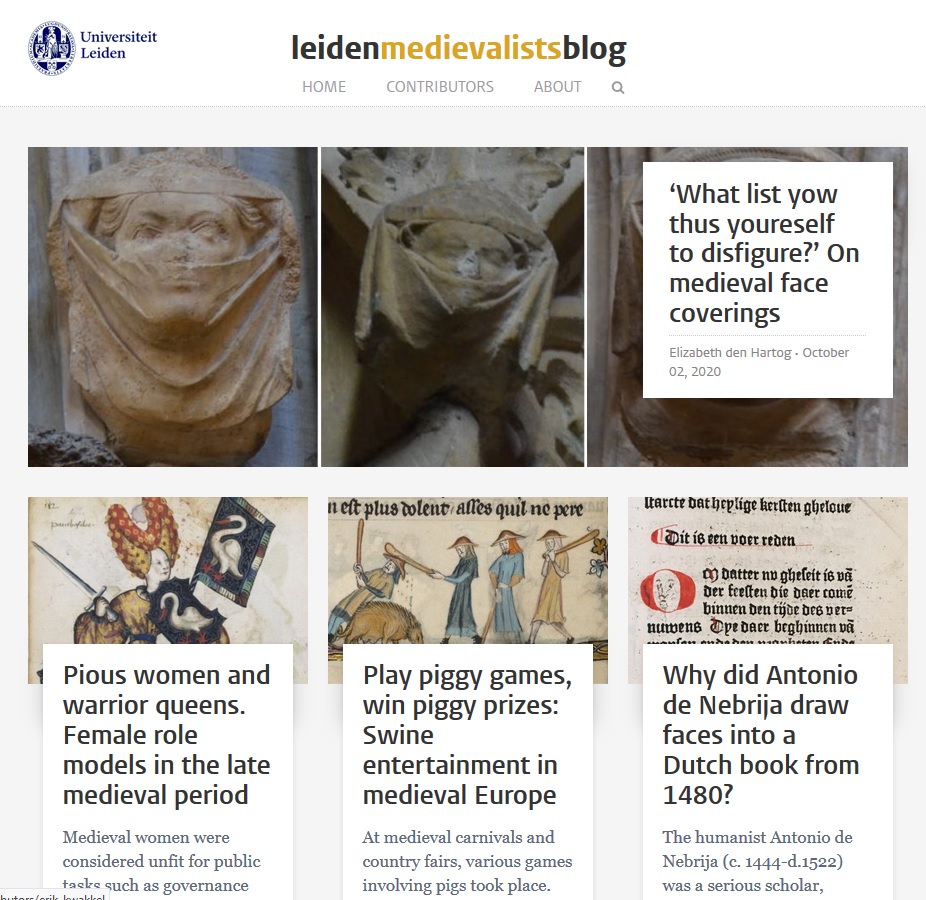
Blogging about the Middle Ages: love magic, face masks and video games
Three years ago, on 13 October 2017, the Leiden Medievalists Blog was established. In their blogs, Leiden researchers from all disciplines talk about the Middle Ages in a fun and interesting way. Editors Jip Barreveld, Marlisa den Hartog and Thijs Porck talk about the blog and why the Middle Ages are still important today.

From blog post to national media
'Blogging is translating sometimes complex, academic material into material for a wider audience. You do this with appealing examples, beautiful images, a link to current events and/or a reference to modern culture', Porck explains. 'Making your own research accessible remains a challenge, but we can see from the number of visitors that we are increasingly successful! Moreover, the blogs are regularly picked up by local and national media, reaching an even wider audience.'
Marlisa den Hartog's blog post on the line between love magic and rape drugs, for example, was picked up by radio programme OVT, which led to an interview with VICE about medieval seducing techniques.
Knowledge from all perspectives
So far, almost thirty different medievalists have added to the blog; historians, archaeologists, art historians, literary experts and philologists.
'Before I became an editor, I didn't realise there were so many Leiden colleagues who investigate the Middle Ages', says Barreveld. 'Thanks to the Leiden Medievalists Blog, this diversity becomes clearly visible and puts Leiden on the map as an (inter)national research centre for medieval studies. Hopefully this visibility will lead to more cooperation, because we could complement each other well with our various specialisms. Archaeology, for example, looks at the material remains of the Middle Ages, the Centre for the Arts in Society looks at literature and art and History focuses on more socio-historical sources. For a good understanding of the Middle Ages, you naturally need all of these perspectives.'

Leiden Medievalists Blog
78 blog posts by 29 writers with more than 150,000 views
The best-read blog posts:
1. Rumi and the Hollywood Stars: The Source of Brad Pitt’s Tattoo
2. Lucky pigs and protective boars: The medieval origins of the Glücksschwein
3. #MeToo in Persian poetry
4. Doodling in the Middle Ages
5. Pigs and Bagpipes: Geoffrey Chaucer's Miller in Context

The image problem of the Middle Ages
When people think of the Middle Ages, this often goes hand in hand with the idea of the "dark ages". Journalists and politicians often use this time period to evoke an image of decay and chaos in the reader. Undeserved, the editors think. 'By now, that's a really outdated metaphor,' says Barreveld. 'Latin poets at the Frankish court, global trade networks and late-medieval sanitation; time and again the Middle Ages emerge as an extremely dynamic period. Let's thus forget the idea of the "dark Middle Ages" for good.'
According to den Hartog, the Middle Ages hold up a mirror to you, in which you can sometimes recognise yourself, and sometimes not at all: 'A lot of the blog posts respond to current events. Because face masks play such an important role in our streetscape today, one of our bloggers has dedicated a post to the different meanings people attached to face masks in the Middle Ages. It is fascinating to discover how differently people thought about certain things at that time, and to put yourself in their shoes. At other times you can see precisely how certain 'medieval' ideas still live on in our own time, for example when it comes to gender and sexuality, which is the topic of my own research.'
'By studying the Middle Ages you learn more about yourself'
From the point of view of archaeology, researchers look at the Middle Ages through an anthropological lens. Barreveld, PhD student at the Faculty of Archaeology, gives an example: 'In early medieval Europe, a lot of people were buried with objects such as weapons and jewellery. What does this say about how they dealt with death and their belief in the afterlife? And what kind of society was behind this? So we try to understand the Middle Ages better, but at the same time we reflect on our own society. How do we actually deal with death? And what does that say about our culture? By studying the Middle Ages you can also learn more about your own living environment.'
'The Middle Ages have an appeal that continues to this day; just look at all the popular culture that uses this period as a source of inspiration: The Witcher, Vikings, Game of Thrones and the fiction of Tolkien', Porck adds. 'That's what several of our blog posts are about; posts about video games that allow you to build medieval cities, about Brad Pitt's medieval tattoo and about the medieval history behind the film The Advocate (1993). Why do the Middle Ages continue to fascinate us so much? And, also important, how are the Middle Ages actually adapted to our own time? By comparing those modern versions of the Middle Ages with the 'real' Middle Ages, we do not only learn more about the past, but also about ourselves.'
A call to all medievalists
The editors would have liked to have organised a special event for the third anniversary of the blog, but unfortunately the pandemic threw a spanner in the works. Fortunately, they will not let that get them down and they are now focusing on their hundredth blog post. 'We would like to celebrate that', they say. 'We would like to give all medievalists at Leiden University the opportunity to meet each other. It would be nice to involve even more medievalists from Leiden in our initiative - so we are calling on every staff member engaging with the Middle Ages to contact us!'
